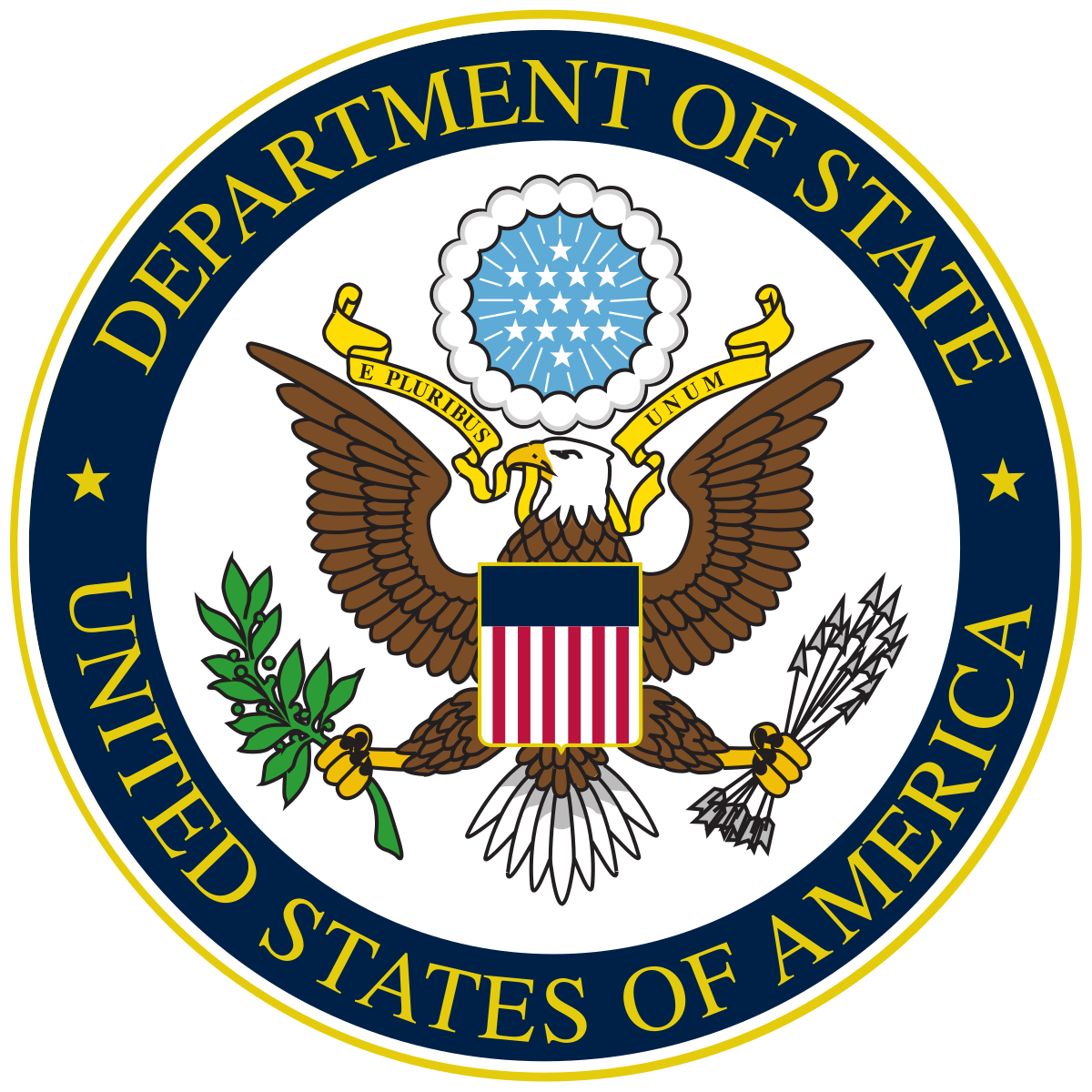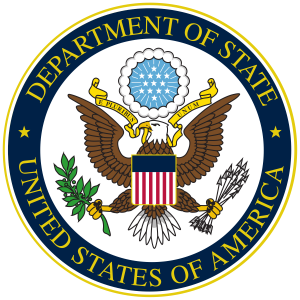By Sami Zaptia.
London, 8 May 2020:
The US Department of State held a Special Briefing by video call on Russian Engagement in the Middle East Thursday which covered both Syria and Libya. The briefing said it aimed to shed some light on ‘‘Russian malign engagement in the Middle East with a specific focus on Russian actions in Syria and in Libya.
It added that Russia has exploited instability in Libya to advance its own military, economic, and geopolitical interest there and throughout North Africa. The three State Department Speakers were:
- James F. Jeffrey, Special Representative for Syria Engagement and Special Envoy to the Global Coalition To Defeat ISIS
- Henry Wooster, Deputy Assistant Secretary for the Maghreb and Egypt
Bureau of Near Eastern Affairs - Christopher Robinson, Deputy Assistant Secretary
Bureau of European and Eurasian Affairs
Summarising the sections from the brief on Libya, the US State Department said that in Libya, the US has two goals: one, an immediate end to the conflict; and two, a return to political negotiations. The United States does not support LNA military action against Tripoli.
On Russian policy in the Libya, the State Department said Russia uses the combination of military power, proxies, and disinformation to shape outcomes, and specifically, is seeking an enhanced presence in Libya to expand its influence across the Mediterranean and also onto the African continent.
On Wagner, which is often referred to as a private military company by the media, the State Department said that Wagner is ‘‘misleadingly’’ referred to as a Russian private military company, but in fact it’s an instrument of the Russian Government.
On the possibility that Russia might end its support for Hafter, the State Department said ‘‘No one should think that Russia is going to pack up and leave now that they’ve invested in the Libyan conflict’’.
On the other states backing Hafter (such as Egypt and the UAE), the brief said the ‘‘US doesn’t see Hafter’s backers backing down soon, don’t see them backing down’’. On Syrian mercenaries, the brief said ‘‘Syrian mercenaries are fighting with both sides’’.
Here are the sections on Libya verbatim including introductions and media questions and answers:
ROBINSON: Libya has become the next venue for Russia’s malign efforts to exploit regional conflicts for its own narrow political and economic gain. While Russia often publicly claims support for a political solution, such as in Syria or Libya, it simultaneously engages in activities that undermine a political peace process and widen the conflict.
In Libya, Russia continues its military support for the Libyan National Army of General Haftar. Russia has provided material and logistical support to the Wagner Group, a U.S.-sanctioned entity led by Putin crony Yevgeny Prigozhin, who is also sanctioned by the United States.
Russia’s surge in support to the LNA has led to a significant escalation of the conflict and a worsening of the humanitarian situation in Libya. Wagner is often misleadingly referred to as a Russian private military company, but in fact it’s an instrument of the Russian Government which the Kremlin uses as a low-cost and low-risk instrument to advance its goals. More recently, Russia in coordination with the Assad regime has ferried Syrian fighters to Libya to participate in Wagner operations in support of the LNA.
WOOSTER: In Libya we’ve got two goals: one, an immediate end to the conflict; and two, a return to political negotiations, or dialogue, if you will. So let me walk you through how we see malign influence out there.
Our starting point is that foreign intervention has exacerbated divisions, widened the conflict, transformed it into a proxy war, threatened regional stability, and as you can imagine, in combination all of these things impinge upon (inaudible) if they don’t harm, in fact, U.S. interests – thus our interests.
So, the Kremlin uses this combination of military power, proxies, and disinformation to shape outcomes, and specifically, Moscow is seeking an enhanced presence in Libya to expand its influence across the Med and also onto the African continent.
And more specifically, Wagner support to Haftar’s LNA or, if you will, the Libyan National Army has escalated the conflict. It’s emboldened the LNA to continue its offensive which in turn is destabilizing, pushing the Government of National Accord – the internationally recognized government which the United States recognizes – it’s pushed them to seek increased Turkish support to counter the Wagner-based LNA assault. So you see the escalatory effects here.
No one should think that Russia is going to pack up and leave now that they’ve invested in the Libyan conflict. So the way to end Russian and other foreign interference in Libya is to first end the Tripoli conflict – of course, that’s the pretext – end that and revive political talks between the Libyans, and this done through UN-facilitated negotiations.
Lastly, on my end of it, a coordinated response from the international community pressing all the actors, Libyan and external, to deescalate is imperative. We, the United States, for our part will continue to press Russia, Turkey, the UAE, among others to encourage LNA and the GNA to return to these UN negotiations. We’re looking for a lasting ceasefire that they (inaudible) sides had agreed to in Geneva in February.
Media question: I’ve been reading that there are Syrian mercenaries on both sides being brought in by the Russians and also the Turks. And if you could give us some detail about that.
WOOSTER: Yes, Syrian mercenaries are fighting with both sides in the conflict, so with the GNA and the LNA. And we have been clear with both the Libyans and both sides within the Libyan conflict as well as the foreign backers of both of those sides that we oppose the deployment of mercenaries.
So long story short, mercenaries of any stripe or type go into the bad column.
WOOSTER: on the question of Syrian mercenaries, there is a very troubling other element here, and that is the Libyan National Army’s or Khalifa Haftar’s establishment of so-called diplomatic relations with the Assad regime, which is very much a part of the piece of the question of Syrian mercenaries, at least on his side of the equation.
Media question: I just had two quickies. One: Could you just spell out what the policy is toward Haftar right now? We had the statement from the White House a year ago saying that the President recognizes Haftar’s significant role in fighting terrorism. That seemed to contradict statements that Secretary Pompeo had made before. So, does the U.S. support Haftar or believe that he has a significant role to play? What is our stance toward him?
WOOSTER: I’ll go quick on the answer about U.S. support for Haftar. No, the United States does not support LNA military action against Tripoli. So, for us, the attack on the capital diverts resources from what is a priority for us, which is the counterterrorism against specifically ISIS and AQIM. It also brings about a humanitarian crisis. Long story short, it’s bad news. We don’t support it, and we don’t support him doing this.
Media question: I wanted to see if you had an estimate of the strength of the Wagner Group. There was the UN report that came out recently that was saying up to 1,200 fighters perhaps in Libya. Do you have a sense of the size and the significance of that? And related to that, there have been a series of reports or indications that perhaps the Russians have soured on Haftar, that they don’t see him as really the best game in town and somebody who’s going to do the job in terms of their interests. What’s your read on that and what’s the endgame for the Russians in terms of what they’re looking for with supporting Haftar?
WOOSTER: Yeah, sure. In terms of the numbers, we had – Assistant Secretary David Schenker did testimony late 2019 on this, and I don’t remember the math so I’m – hesitate to toss out a number saying to you, “I think it was about this.” We used a number – I don’t recollect what that number was off the top of my head. If it’s important to you, we can get that for you. That number will have changed. It will have only gone upwards.
ROBINSON: Yeah, I mean, we’ve seen it fluctuate. I would note that they do possess very heavy and advanced weapons, and we’ve seen them in public media accounting, and social media that follow the conflicts have captured photos of really advanced equipment that private companies don’t tend to have that really illustrates that this is the Russian Government operating the – Wagner.
And on the endgame, look, they may have – find working with General Haftar difficult, but when they say they’re not wedded to one particular actor – but we saw that in Syria, and they got themselves pretty wedded to Assad. We see them say that about Haftar, but they seem to double down on him. Or in Venezuela, and they’ve doubled down on Maduro. They do tend to not back down, even when they’ve made a bad bet.
Media question: I have, very quick, two questions. Haftar has had some – several setbacks on the front line. Do you think there is any chance that his foreign backers would persuade him to end the Tripoli offensive?
And the other thing: You expressed discontent over Haftar establishing ties with Assad. Can you elaborate a little bit more on that? And specifically, have you seen Assad send Syrian fighters to help Haftar in his Tripoli offensive?
WOOSTER: On the matter of different backers, Haftar’s foreign backers, no, we don’t – look, for as long as there is an objective that they can meet through Haftar as an instrument, we don’t see them backing down. Believe me, we are discussing these things with them all the time. We bring these concerns all the time to the backers on both sides, not just with Haftar, and the fingers keep pointing one side at the other. So, I don’t think that in the near-term offing, at least in the foreseeable future, there is any likely prospect whatsoever that that will happen.
JEFFREY: No, except that we know that certainly the Russians are working with Assad to transfer militia fighters, possibly third country, possibly Syrian, to Libya, as well as equipment.








